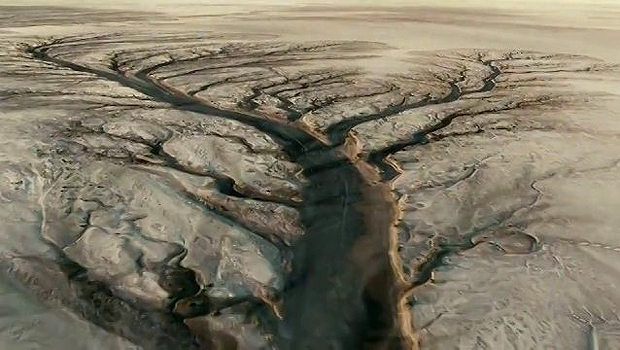Watermark
Director/ Jennifer Baichwal, Edward Burtynsky
Watched in Theater
Rating 3.5/5
The report known as the National Climate Assessment predicts a near future of massive drought, raging wildfires, torrential rains and heavy flooding. In other words, we’re fucked.
But rather than taking a desperate approach to our impending doom, the ruminative new documentary Watermark details our implicit connection to water, the lifeblood of the planet, in a series of dreamy, contemplative vignettes. Directed by Canadians Jennifer Baichwal and Edward Burtynsky, an environmental photographer who collaborated with Baichwal on the stunning 2006 picture, Manufactured Landscapes, the film meanders across the globe, dropping in on Arctic scientists studying ice cores to determine ancient patterns of global warming, observing millions of Indian pilgrims bathing in the Ganges and depicting the grotesque polluting of an urban bay in Dhaka, Bangladesh.
I hope you didn’t see the film when it recently played at Seattle’s Varsity Theater. Thanks to an outdated projector screening an inferior video version, it looked scuzzy and washed-out. (Shame on you, Landmark Theaters, for charging full price!!) Too bad, since the film was shot in gorgeous high-def by Nicholas de Pencier, and imagery is everything in this movie. Majestic scenes of waterfalls and dam flows accentuating the enormous power of water are contrasted with other scenes of humans contorting mother nature to fit our needs, for both pleasure and business.
The movie is murky and beside the point in some scenes, especially those in which we see Burtynsky looking at contact sheets or setting up his expensive camera equipment. And a few of the interviews seem obvious (“We are all made of water”), but overall Watermark is refreshingly short on talking heads and free of hectoring environmental lectures. We get the message anyway. Water sustains us in more ways than we consciously think about. It delivers spiritual sustenance as well as physical; we need it for food but also for inspiration; we can’t live without, yet we take it for granted.

